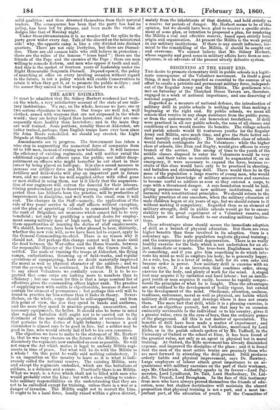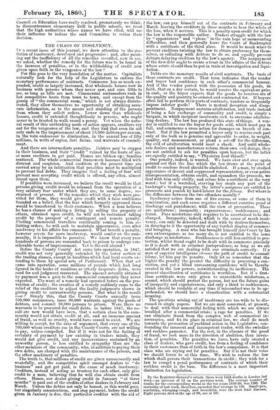BEGINNING AT THE RIGHT END.
THE desire to promote elementary drill in public schools is a legiti- mate consequence of the Volunteer movement. In itself a good thing, it may be almost regarded as essential to the success of an effort to create a patriotic and permanent military force, independ- ent of the Regular Army and the Militia. The gentlemen who met on Saturday at the Thatched House Tavern are, therefore, engaged in a work of national importance, and one deserving of national support.
Regarded as a measure of national defence, the introduction of military drill in public schools is nothing more than making a beginning at the right end. By public schools, we mean all schools that receive in any shape assistance from the public purse, or from the endowments of our benevolent forefathers. If drill were practised in all our public schools, the sons of all classes and conditions of men would receive its benefits. The village schools and parish schools would fit venturous youths for the Regular Army and Militia, save much time and give the State better sol- diers morally and physically. The intermediate class of schools would furnish contingents for the Volunteers : while the higher class of schools, like Eton and Rugby, would give officers to every branch of the service. The saving of time to the youth of the middle classes disposed to enter the Volunteers would be very great, and their value as recruits would be augmented if, on an emergency-, it were necessary to expand the force because re- cruits of this class would have only to be practised in shooting, and battalion and skirmishing drill. There would then be in the mass of the population a large reserve of young men, who would have a sufficient knowledge of military manceuvres and exercises to become useful as soldiers as soon as they entered a corps, to cope with a threatened danger. A sure foundation would be laid, giving permanence to our new military institutions, and in harmony with constitutional principles. We should return to the healthy practices of our ancestors, when the military education of male children began at six years of age but we should return to it without making it compulsory. Regarded then as an element of military .strength, drill in public schools would go far to ensure stability to the great experiment of a Volunteer reserve and would prove of lasting benefit to our standing military institu- tions.
These advantages alone should secure the immediate adoption of drill as a branch of physical education. But there are even higher benefits than these involved in its adoption. Ours is a sedentary age. The male population neglects physical training ; and the consequence is physical degeneration. There is no really healthy exercise for the body which is not undertaken for an ob- ject, immediate or remote. The true-born Englishman wants to do something, and if you give him something to do which inte- rests his mind as well as employs his body, he is generally happy. As a rule, too, he is a lover of order, both for its own sake and because order is power. Now military drill is exercise with an end in view. It is an invention that combines order, strong exercise for the body, and plenty of work for the mind. A stupid lout may acquire it by imitation and hard labour ; but an intelli- gent youth or man acquires it easily, because he rapidly compre- hends the principles of what he is taught. Thus the advantages are not confined to the development of bodily vigour, but extend to the development of the mind. Obedience, attention, coolness, readiness endurance, moral as well as physical, are habits which military ;hill strengthens and develops where it does not create them. The mere fact that drill, while it is a pleasing exercise, is also not an objectless pursuit, but one that may be on occasion eminently serviceable to the individual or to his country, gives it a greater value, even in the eyes of boys, than the ordinary games of the playground. All this is not matter of speculation. The benefits of drill have been made a matter of experiment; and whether in the Quaker school in Yorkshire, mentioned by Lord Elcho, or in the parish schools spoken of by Mr. Tuffnell, in the University of Oxford or the school at Eton, it has been found of the greatest value not only as an, agent in physical but in moral training. At Oxford, the Rifle movement has already diminished expense, and improved the discipline of the place ; and it is found that the men of the most active brains are precisely those who are most forward in attending the drill ground. Drill produces orderly habits and physical improvement, says Dr. Hawtrey. Large employers of labour attach great importance to an ac- quaintance with military exercises on the part of their workmen, says Mr. Chadwick. Authority- speaks in its favour—Lord Pal- merston, Lord Lyndhurst, Dr. Tait, Lord Shaftesbury, Dr. Lid- dell, Dr. Trench, Lord Brougham. In the face of this testimony from men who have always proved themselves the friends of edu- cation, none but shallow doctrinaires will maintain the absurd proposition that physical training is not a part, and a most fill- portant part, of the education of youth. If the Committee of Council on Education have really resolved, prematurely we think, to discountenance elementary drill in public schools, we trust that the high authorities whose names we have cited, will use their influence to induce the said Committee to revise their decision.



























 Previous page
Previous page